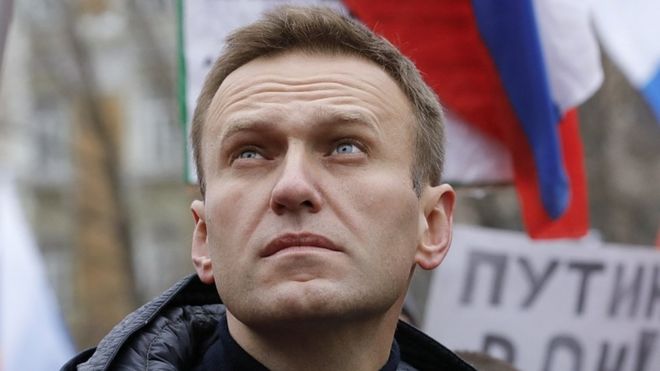Inhibiting Free Discourse in Russia : Critics of Government Will Be Silenced
"We don't believe that the patient suffered poisoning. Poisons or traces of their presence in the body have not been identified. Probably, the diagnosis of 'poisoning' remains somewhere in the back of our minds. But we do not believe that the patient suffered poisoning." Anatoly Kalinichenko, deputy chief physician, Omsk hospital, Siberia
"Another broad analysis has been initiated [while Mr. Navalny remains in a medically induced coma but] there is no acute danger to his life." "Longer-term effects, especially in the area of the nervous system, cannot be ruled out." Charite Hospital statement
 |
| Mr Navalny is being treated at the Charite hospital in Berlin Reuters |
"Cholinesterase inhibitors block a crucial enzyme which regulates messages from nerves to muscles. The enzyme is called acetylcholinesterase. Inhibition of the enzyme interferes with nerve to muscle messaging and muscles are no longer able to contract and relax. They go into a sort of spasm." "All muscles are affected with the most crucial being those which affect breathing. As breathing is inhibited individuals may become unconscious." Alastair Hay, Professor (Emeritus) of Environmental Toxicology at Leeds University
''According to the medical team at the Charite [hospital], the clinical findings point to poisoning of Alexey Navalny. Given the prominent role of Mr. Navalny in the political opposition in Russia, local authorities are now urgently called upon to clear up this crime to the last detail -- and to do so in full transparency." "We hope that Mr. Navalny can recover fully. Our good wishes also extend to his family, which is undergoing a severe test." German Chancellor Angela Merkel/German Foreign Minister Heiko Maas
Independent laboratories confirmed that a toxin believed to be a cholinesterase inhibitor was used to poison prominent Russian opposition figure Alexei Navalny, to still his voice critical of the Kremlin and of Russian President Vladimir Putin. The toxin blocks an enzyme -- cholineserase -- required for the normal functioning of the nervous system. The precise substance used to poison Mr. Navalny has not yet been identified other than generically as a cholinestrase inhibitor.
Atropine, a medication utilized in the treatment of certain types of nerve agent and pesticide poisonings is being administered to Mr. Navalny to counteract the negative consequences of the poison that had been covertly administered in an effort to silence a critic. Stricken Thursday during a Siberia-to-Moscow routine flight, the 44-year-old, according to his spokeswoman along with others, was directly targeted by a state-ordered silencing, yet another victim of a method which the Kremlin and its chief executive officer have found convenient to silence inconvenient opponents.
 |
| Protest in Khabarovsk, eastern Russia, 'Navalny was poisoned' (Igor Volkov/AP) |
It is a situation well known to western intelligence, given Moscow's penchant in sending state emissaries abroad for the express purpose of silencing critics, generally those with inner-circle intelligence and military experience who know whereof they speak when they alert the world community to the Kremlin's covert plans to reassert Russian influence, particularly among the former satellite countries, neighbours of Russia which became unwilling 'partners' within the Union of Soviet Socialist Republics.
Moaning in pain, Mr. Navalny lost consciousness during the Thursday flight which the pilot then aborted, making an emergency landing in Omsk where two days were spent being stabilized in hospital. Emergency physicians took immediate action to place him in a medically induced coma. Doctors at the Omsk Hospital appeared to backpedal on the poison theory, claiming instead a sudden drop in blood sugar had incapacitated the Kremlin clinic.
 |
Russian anti-corruption campaigner Alexei Navalny was
poisoned by a substance that disrupts the nervous system, according to
the Charité hospital in Berlin. Navalny has been in a coma since
Thursday. Odd Andersen/AFP via Getty Image |
Despite Mr. Navalny's family's request that he be allowed to leave the Omsk Hospital to be medic-evacuated to a hospital in Berlin, arranged by a human-rights charitable organization, Omsk doctors balked at discharging their patient, while at the same time denying he was a victim of poisoning. Eventually his release was approved, he was handed over to the custody of three German doctors who had flown in on the evacuation plane, and taken to Berlin, then admitted to the Charite Hospital.
The conclusion reached by the Charite Hospital directly contradicts the Omsk doctors' insistence that no evidence exists to link Mr. Navalny's condition to an administered poisonous source. His associates in the opposition movement are convinced that the Omsk doctors deliberately blocked their patient's move to Berlin, under pressure from Russian authorities determined to hinder foreign investigation into the event. Mr. Navalny is now under the protection of Germany's Federal Criminal Police Office, the very same source that provides security to German Chancellor Angela Merkel.
"The European Union strongly condemns what seems to be an attempt on Mr Navalny's life. It is imperative that the Russian authorities initiate an independent and transparent investigation on the poisoning of Mr Navalny without delay.""The Russian people, as well as the international community, are demanding the facts behind Mr Navalny's poisoning. Those responsible must be held to account." European Union High Representative for Foreign Affairs.
 |
| German army emergency personnel load the stretcher that was used to transport Russian opposition figure Alexei Navalny into an ambulance on August 22, 2020 at Berlin's Charite hospital |
Labels: Germany, Political Realities, Russia
0 Comments:
Post a Comment
<< Home